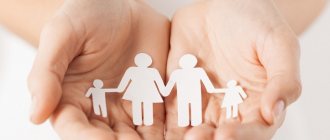Home / Family law / Children's rights
Back
Published: 08/14/2018
Reading time: 8 min
0
837
Sometimes a child is left alone due to the premature death of the people closest to him. In addition, a large number of children lack family comfort even with healthy parents. Such children make up two categories - orphans and those left without parental care.
- Children left without parental care, who are they?
- The difference between the concepts of “orphans” and “children without parental care”
- Privileges
- Rights
- Types of social assistance
In both cases, government agencies begin to take charge of the child’s future life.
Children left without parental care, who are they?
This category includes minor citizens under the age of 18, whose parents are unable or unwilling to fulfill their duties. The reasons for assigning the status of children without parental care are cases when parents:
- deprived of the right to raise children or partially limited in this right;
- one of the parents is declared fully or partially incompetent;
- a serious illness in one or both parents , due to which it is impossible to fully raise and provide financial support for the child;
- are listed as missing;
- suspected of committing offenses;
- are in prison;
- deliberately do not want to raise a child;
- do not fulfill their duties , refuse to protect the rights and interests of the child.
Under such conditions, the issues of placing children in foster or foster families, in special institutions, have to be dealt with by state social services, which identify minors left without parental care, keep records of them and control the future life, nutrition and development of children given to other people for upbringing.
Types of social orphanhood
Separately, we can highlight such a phenomenon as hidden social orphanhood. At the same time, children can live in a family, but in fact remain neglected, since their parents do not show interest in their lives and do not educate them. Often such children become street children and engage in vagrancy.
All minors deprived of parental care are subject to family placement. However, most often this cannot be done quickly. The state system provides for various types of specialized institutions, designed for a certain age of children, taking into account the presence of diseases or length of stay.
If a student at a university or professional institution has not completed his studies, but is over 23 years old, he retains the right to financial support from the state and no one has the right to cancel it. Until the last year of study, orphaned (deprived of parental care) students have the right to financial support from the state.
The ideal option is to place the children in a family or in orphanages, where living in them is as close as possible to living in a family circle. When a minor is adopted, his rights are equal to the rights of his own child. In addition, he can change his last name to the last name of his new parents and get a new name. The new family undertakes to care for, educate, protect and educate the child as if it were their own.
Payment procedure and terms. You can apply at any time after the death of the breadwinner. It is better to do this within 12 months - only in this case will the money be paid for the entire time since the death of the breadwinner. The pension will be assigned from the month in which you applied for it.
- For child care up to one and a half years old - 40% of average earnings. In 2021, the minimum amount of benefits for caring for the first child is 3277.45 R, for the second and subsequent children - 6554.89 R. Maximum size - 26,152.27 RUR.
- For child care from one and a half to three years - 50 RUR.
- To care for a child up to three years old, if the child’s father is conscripted. Size in 2021 - 11,863.27 RUR.
- Additional support, for example, Putin's payments. Size - the cost of living per child in the region.
1. Protection of the rights and interests of children in cases of death of parents, deprivation of their parental rights,
restrictions on their parental rights, recognition of parents as incompetent, illness of parents, prolonged absence of parents, evasion of parents from raising children or from protecting their rights and interests, including when parents refuse to take their children from educational organizations, medical organizations, organizations providing social services services, or similar organizations, when the actions or inaction of parents create conditions that pose a threat to the life or health of children or impede their normal upbringing and development, as well as in other cases of lack of parental care, is assigned to the guardianship and trusteeship authorities.
You may be interested in:: Who is the Initiator of Initiating an Enforcement Case by Bailiffs
Guardianship and trusteeship authorities identify children left without parental care, keep records of such children in the manner established by the federal executive body authorized by the Government of the Russian Federation, ensure the protection of their rights and interests until the issue of their placement is decided, and, based on the specific circumstances of the loss of parental care, elect forms of placement of children left without parental care (Article 123 of this Code), and also carry out subsequent control over the conditions of their detention, upbringing and education.
The difference between the concepts of “orphans” and “children without parental care”
The difference between the two concepts is determined by Federal Law No. 159 of December 21, 1996 “On additional guarantees for social support for orphans and children without parental care.”
Orphans are children whose parents have died. Without parental care, children are left whose parents cannot or consciously do not want to raise the child and take care of him. In this case, the concept of “social orphans” is also used.
Identification and placement of children without parental care
- Within 3 days from the moment the signal is received, specialists are required to visit the child’s place of residence.
- If the information is confirmed, the minor must be placed in a safe place (with relatives, a rehabilitation center, a family placement center).
- Within 3 days, information about the child is transferred to the regional data bank.
- Within 30 days, specialists take measures for family placement of the minor.
- If after a month there is no family ready to accept the child into the family, then he is transferred under supervision to the center for promoting family placement.
- Monthly allowance for the maintenance of the ward - depending on the legislation of the region. As a rule, it is equal to the subsistence minimum per child. Paid for wards and adopted children.
- Remuneration for the adoptive parent depends on the legislation of the region.
Persons from among orphans and children left without parental care - persons aged 18 to 23 years, who, when they were under the age of 18, died both or a single parent, as well as children who were left without the care of a single or both parents.
Orphanhood is a social phenomenon caused by the presence in society of children whose parents have died, as well as children left without parental care due to various social factors. These may include: deprivation of parental rights of both parents or a single parent, recognition of parents as legally incompetent, missing, etc. This also includes children whose parents are not deprived of parental rights, but do not actually provide any care for their children and, in accordance with the procedure established by law, have given consent to their adoption.
20 Apr 2021 urisgkmo 462
Share this post
- Related Posts
- Guardian Debt to Pay Utilities
- Luzhin Crime and Punishment Chapters
- Husband Threatens to Take Child and Take Away 3 Years Old
- Can bailiffs seize a computer if there are children and schoolchildren?
Privileges
To help children who, for various reasons, have lost their closest people, the state provides benefits.
Persons whose parents are no longer alive are entitled to a survivor's pension. Its size depends on the parent’s work experience. If the child has sufficient work experience, he will receive a labor pension; if he has little work experience, he will receive a social pension.
Payments are made until the age of majority or until the heir reaches 23 years of age if he is a full-time student at an educational institution.
When enrolled in various educational institutions, such children enjoy privileges in the form of:
- increased scholarship;
- free food;
- receiving financial assistance to purchase basic necessities;
- discounted travel on any type of public transport.
Students receive a triple scholarship once each year to purchase educational supplies.
After completing the training, the graduate can contact the employment service. Service employees help you find a job by checking your professional suitability and registering it.
If he has no work experience, he will receive a benefit for six months, the amount of which is equal to the average salary in the region.
Medical care is also completely free , both routine examination and required surgical interventions. Funding for treatment is taken from the state treasury.
In addition to all of the above, free health improvement is provided in camps, sanatoriums and boarding houses. Payment for the trip is also made by the state.
As for housing, here too the state does not leave orphans and children without parental care without help. After graduating from a boarding school and reaching the age of 18, a child is an applicant to receive his own square meters of living space.
But for this there must be the following conditions: an orphan or one left without parental care must not have social housing or their own housing (inherited from their parents), relatives also do not have sufficient square footage to register, and if housing is available, it does not meet sanitary standards and other standards.
If these conditions are met, the child is placed on a waiting list for housing.
Benefits also apply to utility bills. To receive them, the child must be a full-time student at a school or vocational education institution, and must also have living quarters. Under these conditions, persons of this category are exempt from paying utility bills and accommodation fees.
If you have your own home, you receive a 100% discount. When living on the territory of the guardian, the benefit is distributed according to the norm of the area sufficient for the ward.
Rights
Orphans and those left without parental care are a weakly protected social group of the population; they need special government support. The rights of such children are regulated by Federal Law No. 159 of December 21, 1996.
Persons from these categories have the following rights:
- personal: these rights guarantee respect for honor and dignity, protection from abuse by a guardian or trustee, upbringing in a guardian or trustee family, communication with parents and relatives, expression of one’s own opinion when questions arise about one’s interests, necessary conditions for living, upbringing, education, development at the expense of public funds;
- property rights: these rights relate to social payments, pensions, alimony, benefits, retain ownership rights to housing, income, property received as a gift or inheritance, priority receipt of housing;
- for free education;
- for free medical care;
- for assistance in finding employment;
- for housing.






